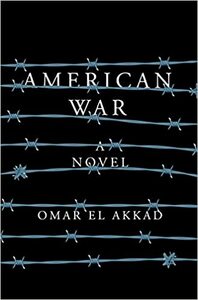Take a photo of a barcode or cover
Probably 2.5 stars. I found this fairly disappointing, I expected a book about a future civil war to be more exciting and it wasn't really. The first third of the book is very dense, really in need of editing. Not much happens but it takes forever to not happen. It's mainly supposed to be character development, but nearly all of the characters remain thin and pretty poorly drawn. Sarat is the most developed character, but I didn't always buy the development. It picked up more in the middle, though it was still pretty slow and dreary, and then it really flew to the ending, which was very clearly going to be the ending from about the first quarter on. This is one of those books that had such a great, promising premise and just didn't deliver. I actually think it would have been a better book if it had zoomed out and not been so wholly, intensely focused on one character.
The setting is this futuristic war-torn America rooted somewhat in environmental issues, and attempts to shine a light on what could come for us. It made me consider Bradbury's Fahrenheit 451 (a 1950's prediction of a time that is NOW), only it's scarier because I believe this could really happen.
I wanted so much more detail in regards to the time period! I was so intrigued in the first few pages with the borders/maps of the United States being altered due to climate and war. I wanted more world building here, with a lot more focus on the differences in the American landscape/geography and the environmental changes and political turmoil that have gone on for 70+ years. In this regard, I felt let down. There is much more focus on the personal life of Sarat then there is of America as a whole. I kept having to remind myself this is a novel, not a nonfiction prediction of our country.
It's clear from the title and the first few pages this is obviously not a happy story. But it is thought- provoking and eye-opening for a fiction novel. I'm craving more about this world that Akkad has set up.
I wanted so much more detail in regards to the time period! I was so intrigued in the first few pages with the borders/maps of the United States being altered due to climate and war. I wanted more world building here, with a lot more focus on the differences in the American landscape/geography and the environmental changes and political turmoil that have gone on for 70+ years. In this regard, I felt let down. There is much more focus on the personal life of Sarat then there is of America as a whole. I kept having to remind myself this is a novel, not a nonfiction prediction of our country.
It's clear from the title and the first few pages this is obviously not a happy story. But it is thought- provoking and eye-opening for a fiction novel. I'm craving more about this world that Akkad has set up.
The first half of the book was a little difficult for me to fully immerse myself in. That being said, once it started to pick up, it was hard for me to put the book down. A fantastic novel, El Akkad creates a future full of chaos, poverty, and war, but one that was based on many of the political hot topics of today, making it not seem that futuristic at all.
Dark, powerful and haunting. A terrifying story about a possible future of the Untied States. Really makes you think about the brutality of war and the choices of those involved for whatever reason.
adventurous
challenging
dark
emotional
sad
slow-paced
Plot or Character Driven:
A mix
Strong character development:
Complicated
Loveable characters:
No
Diverse cast of characters:
No
Flaws of characters a main focus:
Complicated
I was not a fan of this book. It did not turn out to be what I thought it was and unfortunately, I did not like what it was. I did not find the main character to be sympathetic or likable at all and I found the story to be rather slow-moving as well. I almost stopped reading it about halfway through, but I hate to not finish a book. The end did tie things together so I was glad I finished it at least.
I am really bad at writing reviews, but I am surprised by the negative reviews for this book. It is a wild dystopian novel that is so deeply connected to our current reality, that I didn’t find myself having to exercise much suspension of disbelief at all. I am always fascinated by an author’s ability to avoid the hard lines that define hero v. villain, and Omar El Akkad does just that in a brilliant way.
American War was a very dark novel about a futuristic civil war. I thought it was well written and the characters were well-developed. All the political drama the United States is experiencing now ties into this novel and opens my eyes to the fact this could really happen. I highly recommend this novel but just know it is dark all the way through.
dark
sad
slow-paced
Plot or Character Driven:
Character
Strong character development:
Yes
Loveable characters:
Yes
Diverse cast of characters:
Complicated
Flaws of characters a main focus:
No
Well, this was... underwhelming.
Where do I start...
As I didn't read the English original but listened to the German audiobook, I don't feel able to criticize the language as such. Criticism there might always be due to poor translation.
What is definitely on the author himself, though, is the (lack of) character depth and development in basically all of the cardboard cut-outs populating this novel and the lack of both "innovation" and progress in the society he "builts". The more adequate word would be "pieces together from newspaper clippings and history books".
His version of the near-future is a re-run of the American Civil War with some more recent types of war crimes and some climate change effects added for shock value. All these things remain sadly decorational, I felt. The author couldn't even be bothered to invent any technical progress, or any new political power dynamics in a way that contained more than making the US the receiving end of destabelization now.
The characters, as mentioned before, felt extremely flat. The main character was one of the worst attempts at (I'm guessing here) hardened kick-ass female anti-hero that I've seen in some time. A clichee in any way possible - a slightly aggressive tomboy in behaviour, not attractive bordering on ugly and "unfeminine"/"manly" in looks, and, to complete clichee bingo, lesbian with extremely short hair. Still, she couldn't put two and two together but for the help of a manipulative older man who turned her into a tool. The reader gets to see her whole life as a chain of cause and effect, all outwardly induced. And I as a reader couldn't even be bothered to feel anything for her. I spent about fourteen hours listening to what should have been a devastating example of what war, loss, misinformation and general cruelty can do to a person - and it did nothing.
I later read that the author is a political journalist and that this is his first novel. Well. That at least explains some of what felt off. You don't get character development and fictitious embellishment in reports (and really you shouldn't). But then, fictional texts can profit greatly from both while still offering relevant criticism on the real world. As novels tend to be longer than articles or arctile series in newspapers, you also don't have to be as direct and on the nose with what you want the reader to understand. Subtlety often does work better than patronizing readers of fiction opinionwise.
Not all people can produce both kinds of texts, fictitious and "realistic", in the same quality, though. And had I not had this book as an audiobook, I wouldn't have finished it.
Where do I start...
As I didn't read the English original but listened to the German audiobook, I don't feel able to criticize the language as such. Criticism there might always be due to poor translation.
What is definitely on the author himself, though, is the (lack of) character depth and development in basically all of the cardboard cut-outs populating this novel and the lack of both "innovation" and progress in the society he "builts". The more adequate word would be "pieces together from newspaper clippings and history books".
His version of the near-future is a re-run of the American Civil War with some more recent types of war crimes and some climate change effects added for shock value. All these things remain sadly decorational, I felt. The author couldn't even be bothered to invent any technical progress, or any new political power dynamics in a way that contained more than making the US the receiving end of destabelization now.
The characters, as mentioned before, felt extremely flat. The main character was one of the worst attempts at (I'm guessing here) hardened kick-ass female anti-hero that I've seen in some time. A clichee in any way possible - a slightly aggressive tomboy in behaviour, not attractive bordering on ugly and "unfeminine"/"manly" in looks, and, to complete clichee bingo, lesbian with extremely short hair. Still, she couldn't put two and two together but for the help of a manipulative older man who turned her into a tool. The reader gets to see her whole life as a chain of cause and effect, all outwardly induced. And I as a reader couldn't even be bothered to feel anything for her. I spent about fourteen hours listening to what should have been a devastating example of what war, loss, misinformation and general cruelty can do to a person - and it did nothing.
I later read that the author is a political journalist and that this is his first novel. Well. That at least explains some of what felt off. You don't get character development and fictitious embellishment in reports (and really you shouldn't). But then, fictional texts can profit greatly from both while still offering relevant criticism on the real world. As novels tend to be longer than articles or arctile series in newspapers, you also don't have to be as direct and on the nose with what you want the reader to understand. Subtlety often does work better than patronizing readers of fiction opinionwise.
Not all people can produce both kinds of texts, fictitious and "realistic", in the same quality, though. And had I not had this book as an audiobook, I wouldn't have finished it.




